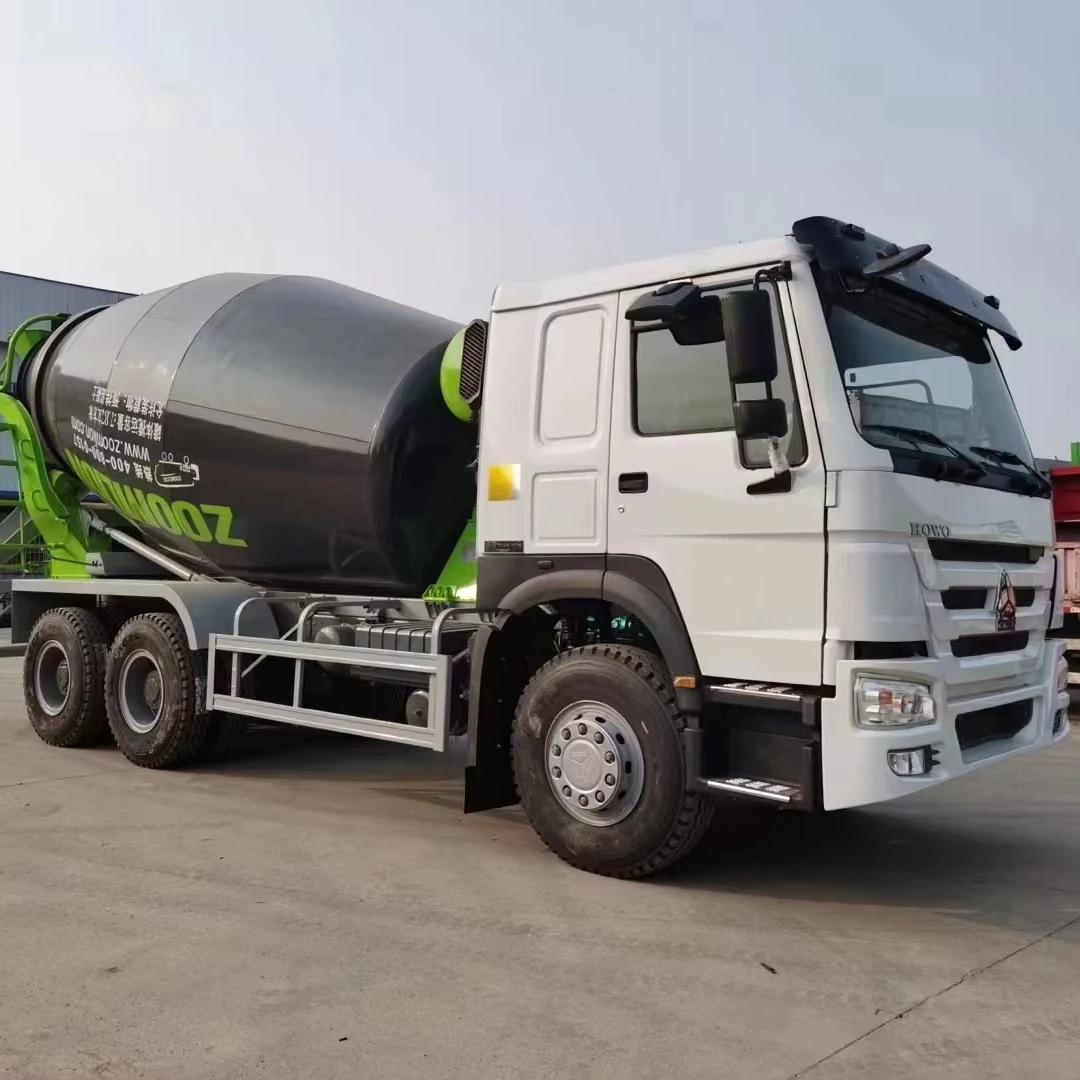Essential 8x4 Truck Engine Maintenance
Maintaining your 8x4 truck's engine is crucial for optimal performance and longevity. Regular maintenance checks, including oil changes, fluid checks, and air filter replacements, ensure the engine runs efficiently and reduces the risk of costly repairs.
Optimal Oil Change Intervals for Diesel Engines
Engine oil plays a crucial role in keeping things running smoothly inside an engine. It not only lubricates moving parts but also helps carry away excess heat generated during operation. When the oil stays clean, it protects those metal components from grinding against each other too much, which means the whole engine lasts longer before needing major repairs. Most diesel engines need their oil changed somewhere between 5,000 and 15,000 miles, though this varies quite a bit based on how hard they're worked. Small delivery vans or pickup trucks generally don't need oil changes as often as big rigs that spend all day hauling heavy loads across highways. Mechanics I've talked to say regular oil changes can really extend engine life sometimes by as much as 30 percent over time, making it one of the simplest yet most effective maintenance routines anyone can follow.
Critical Fluid Checks: Coolant and Transmission
Truck owners need to keep an eye on coolant levels to avoid engine problems, particularly during hot summer days or when hauling heavy loads over long distances. Checking both coolant and transmission fluids regularly makes a big difference for overall performance. Just look at the dipstick, check what color everything is, and swap out old fluids with those approved by the manufacturer when needed. Most mechanics will tell drivers to get these checks done around the 30k mile mark, though some situations might require more frequent attention. Proper maintenance of these systems not only saves money at the gas pump but also keeps trucks running longer before major repairs become necessary.
Air Filter Replacement for Peak Combustion
Good air filters really matter when it comes to keeping engines running smoothly, cutting down on harmful emissions, and getting better gas mileage overall. When clean, these filters let enough air into the engine so combustion works properly. Most folks find they need new filters somewhere around the 15k to 30k mile mark, though things like sluggish acceleration or dashboard warnings might mean replacing them sooner than expected. When looking at filters during inspection time, drivers often face a choice between those that can be cleaned and reused versus single-use disposables. The decision usually depends on what kind of car someone owns and how much maintenance they want to handle themselves. Changing air filters regularly isn't just good housekeeping either—it actually helps boost fuel economy by roughly 10 percent according to tests, which means saving money at the pump while also being kinder to the environment in the long run.
Tire and Brake System Maintenance
Proper Tire Pressure Management for Heavy Loads
Keeping tires properly inflated matters a lot for safety when operating heavy duty trucks and maintaining their load carrying ability. Well maintained tire pressure gives better traction, makes the truck carry weight more efficiently, and cuts down chances of getting into trouble from sudden tire failures. When looking at tire pressure levels, particularly when loads change around, drivers should tweak them according to what the manufacturer suggests plus consider actual driving conditions they encounter daily. Getting tire pressure right saves money on gas while making those expensive rubber components last longer too. According to research from the U S Department of Energy, just keeping tires properly filled can boost fuel savings somewhere around 3 percent. Most mechanics recommend using good quality digital gauges or installing TPMS systems if available these days to keep track of pressure changes without constantly stopping roadside to check manually.
Rotating and Balancing Dual Wheels
Keeping dual wheels rotated and balanced regularly makes all the difference when it comes to even tire wear and extending their lifespan, particularly important for those big rigs and semi trucks out there. When tires aren't rotated properly, they end up wearing down unevenly, burning through more fuel and forcing drivers to replace tires way too often. Most mechanics recommend sticking to either straight line rotations or going with the crisscross method depending on the vehicle setup. Wheel balancing works wonders too by cutting down on annoying vibrations during long hauls while making sure the ride stays smooth. This also takes pressure off the suspension components that would otherwise take a beating from imbalanced wheels. For anyone running commercial vehicles, basic maintenance routines need to cover checking tire pressures monthly, planning rotations around 5k to 8k mile intervals, and keeping an eye on both wheel alignment and balance status throughout the year.
Brake Pad Inspection and Replacement Protocols
Checking and replacing truck brake pads regularly is essential for keeping vehicles safe and running properly. Most drivers will notice when their brakes need attention through telltale signs like squeaky sounds, longer stopping distances, or a brake pedal that vibrates underfoot. Mechanics generally recommend looking at brake pads every 20k to 60k miles, though this can vary quite a bit based on how hard the truck is worked and what kind of roads it travels. Spending a bit more on quality brake pads pays off in the long run. They last longer, stop better, and handle heat much better than cheaper options that tend to wear out faster. The NHTSA has found that proper brake care cuts down accident chances by around half, which makes regular checkups not just smart maintenance but potentially life saving too.
Electrical Systems and Component Care
Battery Maintenance for Extreme Conditions
Truck batteries need proper care, particularly during those harsh temperature extremes we sometimes face. When it gets really cold outside, batteries just don't work as well because their capacity drops off significantly. Regular maintenance makes all the difference here. Clean those terminals regularly, look for any corrosion buildup, and make sure everything stays connected properly. Testing the battery condition periodically with a good voltmeter is something smart operators do. Most folks find that replacing batteries somewhere between three and five years keeps them from getting stuck unexpectedly. Watch for warning signs too like engines taking longer to start or headlights dimming while driving. These little clues often point to trouble ahead if ignored long enough.
Wiring Harness Protection Tactics
The wiring harness in a truck plays a critical role in keeping everything running properly, so protecting it should be a top priority for anyone who owns or maintains commercial vehicles. When wiring gets exposed to things like road salt, extreme temperatures, or constant vibration, serious electrical problems can develop over time. Wrapping vulnerable sections with heat resistant tape or installing rubber grommets at entry points helps keep the harness safe from everyday abuse. Checking under the hood every few months makes sense too look for anything unusual like brittle insulation, strange smells coming from wires, or connections that feel loose. Small issues tend to grow fast if ignored, often resulting in breakdowns on remote highways or worse yet, fire risks. Most mechanics will tell drivers to inspect their harness regularly and invest in quality protective gear rather than waiting until something goes wrong.
Chassis and Preventive Maintenance Strategies
Undercarriage Rust Prevention Techniques
The undercarriage of trucks faces a real problem when it comes to rust buildup. Left unchecked, this corrosion eats away at metal components over time, which weakens the whole structure and leads to expensive fixes down the road. Keeping things clean matters a lot here. Washing off those road salts and dirt after driving through winter conditions helps stop rust from taking hold. Protective coatings work wonders too. Spraying the undercarriage creates a shield against water and other stuff that causes corrosion. Some folks swear by special rust inhibitors as well. These products give an added boost to protect the frame so the truck lasts longer without falling apart. Most mechanics will tell anyone who asks that regular maintenance makes all the difference in keeping rust from becoming a major headache later on.
Putting money into rust prevention actually pays off big time down the road. When trucks start corroding, fixing all that damage runs into serious cash, sometimes thousands upon thousands. And then there's what happens when vehicles have to sit idle during repairs. Some studies suggest that keeping the undercarriage well maintained cuts down on repair bills by around half give or take. Looking through what we have available? The utility trailers we carry are pretty tough cookies designed to handle rough environments without breaking a sweat. Makes sense really, since preventing rust isn't just about saving money, it keeps trucks running reliably year after year despite whatever Mother Nature throws their way.
Implementing a Proactive Service Schedule
A good proactive maintenance plan makes trucks last longer and run better overall. Reactive maintenance just fixes things when something goes wrong, while being proactive means getting ahead of potential problems through regular checkups. The basics really matter - changing oil on time, checking fluids regularly, looking at those critical parts like brakes and tires during routine visits. When everything gets attention before it breaks down, drivers avoid those frustrating roadside emergencies that nobody wants to deal with. Most fleet managers know this already, but many still fall into the trap of waiting until something breaks before doing anything about it.
Creating reminders or getting maintenance management software really helps keep tabs on when services need doing. Most systems let operators know ahead of time about things like oil changes, tire rotations, and brake checks so nothing gets missed between visits to the shop. Research indicates companies sticking to regular maintenance routines tend to see far fewer breakdowns happening on their vehicles, which obviously makes them run better and safer overall. The benefits go beyond just avoiding problems though. Trucks maintained properly last longer in service and perform much better during daily operations, making it clear why consistent service intervals matter so much for fleet managers looking to get the most out of their equipment.






